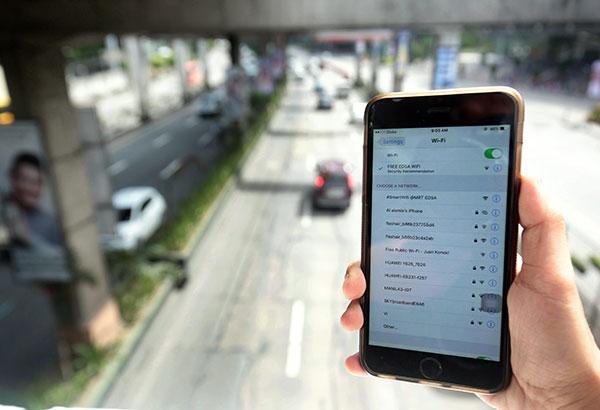Commentary: Digital transformation important for transparency of gov't services

WI-FI ON EDSA: A phone shows free wi-fi connection on EDSA as the Department of Information and Communications Technology tests the service for its launch today. PLDT and Globe Telecom have
partnered with the DICT to provide free high-speed internet on EDSA. MICHAEL VARCAS
Last week, our institute, Stratbase ADRi, partnered with the La Salle Institute of Governance and the International Budget Partnership to hold a virtual town hall discussion on the Philippines' performance in the 2019 Open Budget Survey (OBS). The survey is a comparative assessment of 117 countries' performance in terms of the three pillars of public budget accountability: transparency, oversight and public participation.
Francisco Magno, who serves as the OBS country expert for this survey, said that the Philippines, with an overall score of 76/100, showed continuous improvement, performing well above the global average and ranking first in South East Asia. The country's improved performance in the survey was attributed, in part, to the public availability of key budget documents both online and in-person, such as the Enacted Budget, Citizens Budget and Audit Report.
While the country scored well in the OBS, Magno also identified areas where it could improve. His recommendations included increasing the reports and data publicly available and expanding mechanisms for more public and civil society participation.
The government can improve these areas by prioritizing policies and programs that hasten the country's digital transformation.
According to the Department of Budget and Management (DBM) Secretary Wendel Avidsado, one of our speakers during the event, as one of the founding members of the Open Government Partnership, the Philippines is committed to harnessing new technologies to promote transparency, empower citizens and fight corruption.
Avisado also shared some of the programs and initiatives that his department is implementing, which, more recently, included issuing a local budget circular that requires all local government units to make their reports on utilizing COVID-19 response funds available online.
Similarly, the Senate committee on finance Chairperson Sonny Angara also mentioned that the Philippine Senate has tried to bring transparency to the budget deliberations process by making the proceedings available live online and budget documents downloadable on their website.
These sorts of initiatives from the DBM and Senate are welcome since they give the public access to important budget information. Initiatives like these also set the stage for even further transparency and more involved public participation.
The Philippine government's performance in the OBS shows its openness to strengthening its transparency, oversight and public participation mechanisms. It now must step up to the next challenge of providing more than mere "read-only" access and creating a more inclusive and participatory digital governance environment.
For example, in addition to allowing the public to watch budget deliberations online, the government must also encourage the public to participate in the policymaking process by asking questions or raising important issues through social media platforms.
Furthermore, instead of just sharing a curated set of reports through agency websites, public institutions should make raw government data sets on things like the budget and public procurement contract available online.
Making this sort of data available would allow the academe and civil society members to analyze this raw data and break it down into simplified infographics and interactive charts that the public can quickly appreciate and share with friends and family on social media.
These initiatives tap into technology, and partners like the academe and civil society, to translate and present government data in creative ways while also empowering citizens to take action within their communities. Furthermore, this type of transparency can also build much-needed trust in public institutions.
Understandably, these digital solutions cannot be implemented overnight, but recent developments have put the Philippines in the position to take significant steps forward.
Speaking at the town hall discussion, Commission on Audit Chairperson Michael Aguinaldo said that the COVID-19 pandemic had accelerated the digitization process in government out of sheer necessity.
He added that "this is good because traditionally [the] transition to digitization is met somehow by different types of resistance, and it really takes so long to get that done. This pandemic has forced us to actually move faster in terms of digitization, and hopefully, the existing infrastructure will be improved as well to support the greater reliance or the growing reliance on digitization."
Chairperson Aguinaldo also raises a good point about the urgent need to match our growing reliance on technology with the necessary digital infrastructure.
Our sudden shift towards digital technology, particularly our dependence on reliable internet access, has highlighted the country's need to expand its digital infrastructure network. It has also revealed the various bureaucratic roadblocks that have stunted its growth over the decade and have forced the government to address them quickly.
Hopefully, this newfound appreciation and support for expanding digital infrastructure are here to stay since its continued development is crucial to our digital transformation and governance.
That said, the government must also address capacity problems—and not just the kind you might have in mind.
Sure, adopting these hi-tech tools to increase transparency and fight corruption must come with the corresponding training to ensure our public servants can maximize these new tools. But more than that, the government must be able to show the public that they have the capacity to participate in policy debates and impact policy outcomes directly.
The government must use this growing appreciation for technology as an opportunity to push for digitization in government. It must build on the Philippines' success in the recent 2019 OBS to institutionalize transparency, public participation and oversight mechanisms. Furthermore, it must take steps to ensure that the public can not only listen but be heard.
Paco Pangalangan is the executive director of think tank Stratbase ADR Institute.
- Latest
























